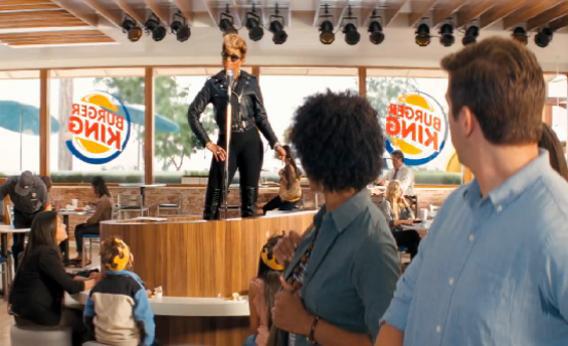Two days ago, the struggling fast-food chain Burger King unveiled several new ads online. Each featured a celebrity, but the only one anybody wanted to talk about—and share, and mock, and remix—was the 30-second spot in which Mary J. Blige uses her signature wail to tout Burger King’s crispy chicken snack wraps.
The ad was subsequently pulled from the Internet. (Gawker has kept it online.) Burger King claims they pulled the ad due to “licensing” issues, and that it will return soon. I’ll be keeping an eye out. The timing of its disappearance is suspicious: In addition to all the well-warranted mocking of the ad, Burger King also came under fire from those who claimed the commercial was racist—a far more dubious claim.
The supposed problem? While the ads with Salma Hayek and Jay Leno name-check all the new menu items, and David Beckham gets to lend his support to Burger King’s strawberry smoothie, Mary J. Blige sings about fried chicken.
The history of blacks and fried chicken is complex, as Jesse Bering explored on Slate last year. As Bering notes, fried chicken is associated by many with poverty, thanks to its possible connection to slave plantations and its more recent place on fast-food menus. The food item can become a touchy subject when explicitly advertised with black faces. Popeyes faced similar—and not unfounded—criticism for its own black spokeswoman, whose plastered-on smile and hokey affectations are supposed evoke New Orleans, but which also conjure memories of minstrelsy. (The Popeyes spots bear a troubling resemblance to the satirical commercial in Drop Squad, a biting 1994 film directed by Spike Lee protégé David C. Johnson.)
It is short-sighted—and frankly, insulting to Blige—to attribute the Burger King spot to “coonery.” Burger King has been honing its cheesy advertising chops for years, most famously with their creepy corporeal version of the “King”; Blige is clearly in on the camp factor of the commercial. And other recent ads have far surpassed this one in ignorantly deploying racial stereotypes.
So why the uproar this time? Perhaps the answer has to do with the ad’s intended audience. Unlike the many fast-food commercials aimed specifically at black audiences, usually found on black-targeted networks like BET, the Blige ad features a mostly white supporting cast. It is meant to appeal to a “mainstream” (read: white) audience; some of the ad’s critics seem worried about the way it might make black people look to white people.
Consider this McDonald’s ad from a few years ago—which I only ever saw on BET and another black network, TVOne—in which a black man sings about his wife not sharing her McNuggets with him, crooning: “Girl, you got a 10-piece, now don’t be stingy.” It’s just as lame as the Burger King spot (lamer, perhaps, as it seems unaware of its campiness), and it, too, is not at all racist.
Several years ago, Dave Chappelle joked about feeling self-conscious while eating chicken in front of white people. The Mary J. Blige commercial seems to have prompted a similar reaction from some black observers—without Chapelle’s accompanying self-awareness. As he memorably pointed out, fried chicken is delicious, and it’s ridiculous to feel ashamed about eating it. Should Blige feel ashamed to sing about it? Only because her lyrics in this case are embarrassing, and the production values mediocre. Not because she’s black.
